

By Dr. Tim Orr
This blog draws on the December 2024 research report titled Shifting Narratives: How Israel and Jews Are Seen on X and TikTok After October 7, conducted by the Social Media & Hate Research Lab at the Institute for the Study of Contemporary Antisemitism, Indiana University.
Antisemitism is not just an ancient prejudice—it is a persistent and evolving threat that manifests in new and dangerous ways in our digital age. Social media platforms, which shape public opinion and amplify voices, have become battlegrounds where antisemitic narratives spread with alarming speed and reach. This issue demands our attention because antisemitism is not only a threat to Jewish communities but also a barometer of broader societal intolerance. The December 2024 report, Shifting Narratives: How Israel and Jews Are Seen on X and TikTok After October 7, highlights how pivotal events, like the Hamas attacks, can trigger surges in hateful rhetoric and misinformation. As this data makes clear, addressing antisemitism is about safeguarding truth, dignity, and the shared humanity that binds us all.
Before October 7, 2023, antisemitism on X was already a major issue. In early September, over 27% of the top tweets containing the word “Jews” were explicitly antisemitic. On the flip side, nearly 28% of tweets actively called out antisemitism, showing a significant pushback.
Everything changed after the Hamas attack on October 7. During that week, antisemitism in top tweets stayed steady at 28%, but the response to it was loud—tweets calling out antisemitism surged to 39%. People were quick to denounce the hate.
Unfortunately, that momentum didn’t last. By May 2024, antisemitic content spiked to over 50%, while tweets fighting back dropped to just 12%. This was a sobering shift. By September 2024, antisemitism dipped slightly to 43%, and tweets speaking out against it recovered to 33%. The battle against antisemitism on X is ongoing, but it’s clear that engagement comes in waves.
Antisemitism in Top Tweets
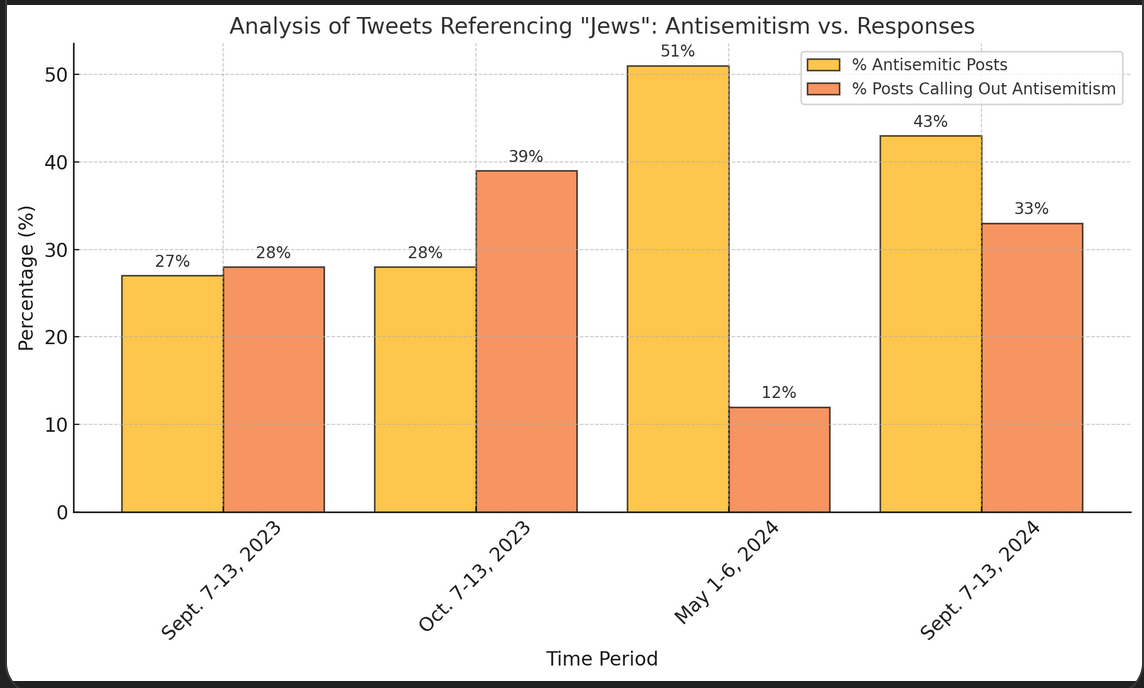
Graph 1: Antisemitism in Top Tweets Containing the Keyword "Jews" and Calling Out Antisemitism, September 2023 - September 2024
Negative Sentiments Toward Jews and Israel
It’s worth noting that negative sentiments toward Jews and Israel were even more prevalent than explicit antisemitism. From September 2023 to September 2024, negativity toward Jews ranged from 37% to 47%, while Israel faced criticism in 33% to 51% of top tweets.
The week following October 7 was particularly intense. Negative sentiment toward Israel peaked at 51%, reflecting the emotional reaction to the conflict. Over the year, negativity toward Jews climbed by 10%, highlighting a worrying long-term trend.
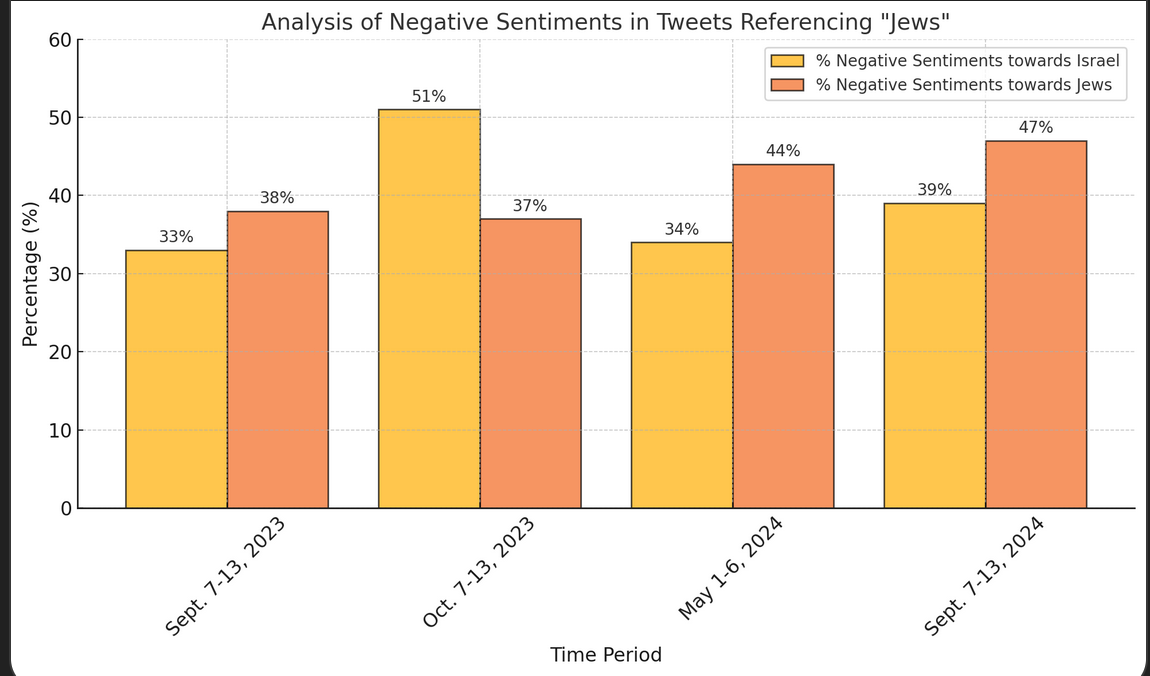
Graph 2: Negative Sentiments Toward Jews and Israel in Top Tweets Containing the Keyword "Jews"
Key Themes in Conversations About Jews on X
Before October 7, conversations about “Jews” on X were diverse. While the Israeli-Palestinian conflict was common, most tweets focused on U.S. politics, religious scripture, and social issues.
After October 7, everything shifted. During the week of the Hamas attack, 75% of tweets about “Jews” were tied to the war with Hamas. This focus lessened over time—by May 2024, war-related content fell below 40%.
Anti-Israel protests also became a consistent theme. Before October 7, only 6% of tweets mentioned protests. After the attacks, that number more than doubled and remained high in every sample.
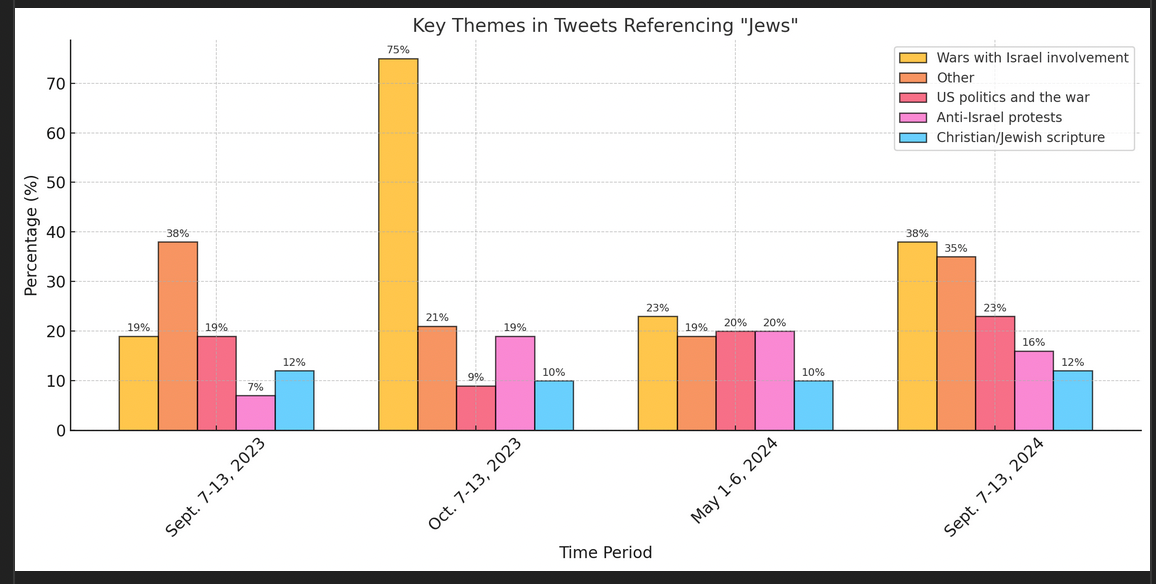
Graph 3: Themes in Top Tweets Containing the Keyword "Jews"
Accusations Against Israel on X
Accusations against Israel—including claims of war crimes, genocide, colonization, and apartheid—rose sharply after October 7. What’s particularly striking is that these allegations peaked immediately after the attack, even before Israel’s ground operations began.
While accusations like these existed before October 7, the conflict dramatically amplified them. By September 2024, the intensity remained high, with genocide being the most frequent accusation.
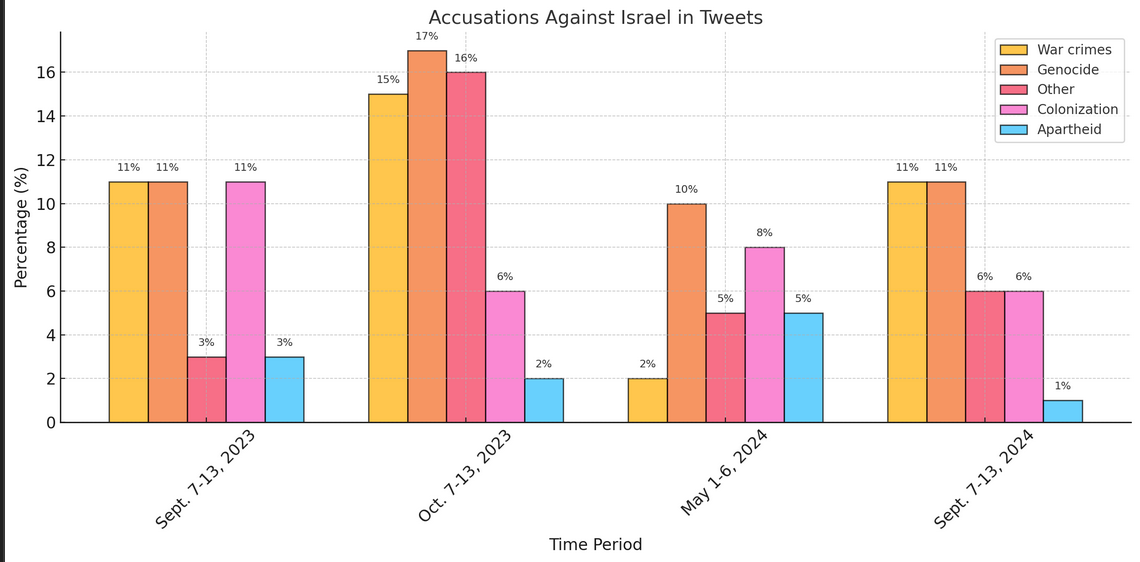
Graph 4: Accusations Against Israel in Top Tweets Containing the Keyword "Jews"
Accusations Against Israel on TikTok
Accusations in TikToks Containing "Genocide" and "Israel"
The story took a similar turn on TikTok but with some notable differences. In early October 2024, we sampled posts containing the keyword “genocide,” and the results were stark: the majority of posts accused Israel of genocide in Gaza. Only 39.5% of posts avoided such accusations.
When we looked at posts using the keyword “Israel,” the picture was more balanced. A striking 83.5% of posts contained no accusations at all. War crimes were mentioned in 6.5% of posts, and genocide in 3.5%.
Graph 5 and Graph 6 show the difference:
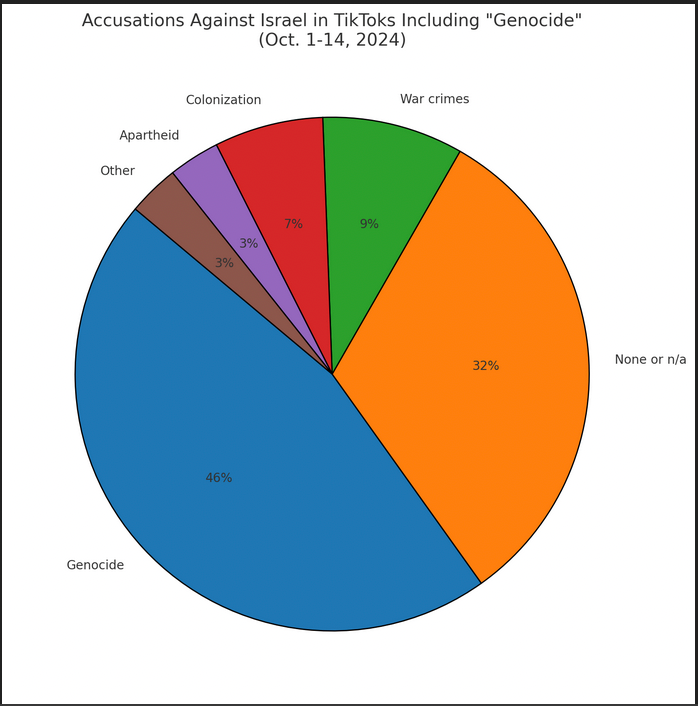
- Graph 5: Accusations Against Israel in TikToks, Including "Genocide"
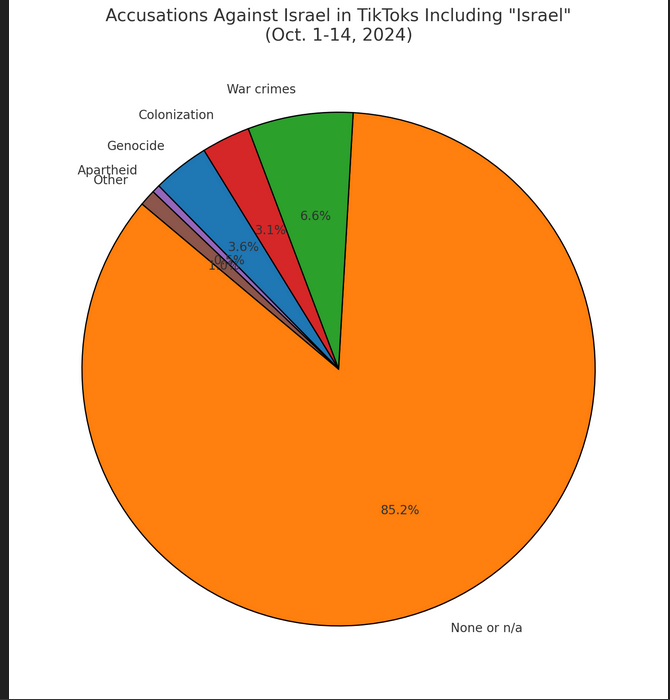
- Graph 6: Accusations Against Israel in TikToks Including "Israel"
Themes in TikTok Content
The Gaza war dominated TikTok content with “genocide” as a keyword. Over 59% of posts were directly about the war. U.S. politics, anti-Israel protests, and other related issues made up the rest.
In contrast, posts containing “Israel” were more varied. While 26.5% were about the Gaza war, 14.5% had nothing to do with Jews or Israel (e.g., people with the name Israel), and 11% referenced Christian or Jewish scripture.
Graph 7 and Graph 8 break it down:
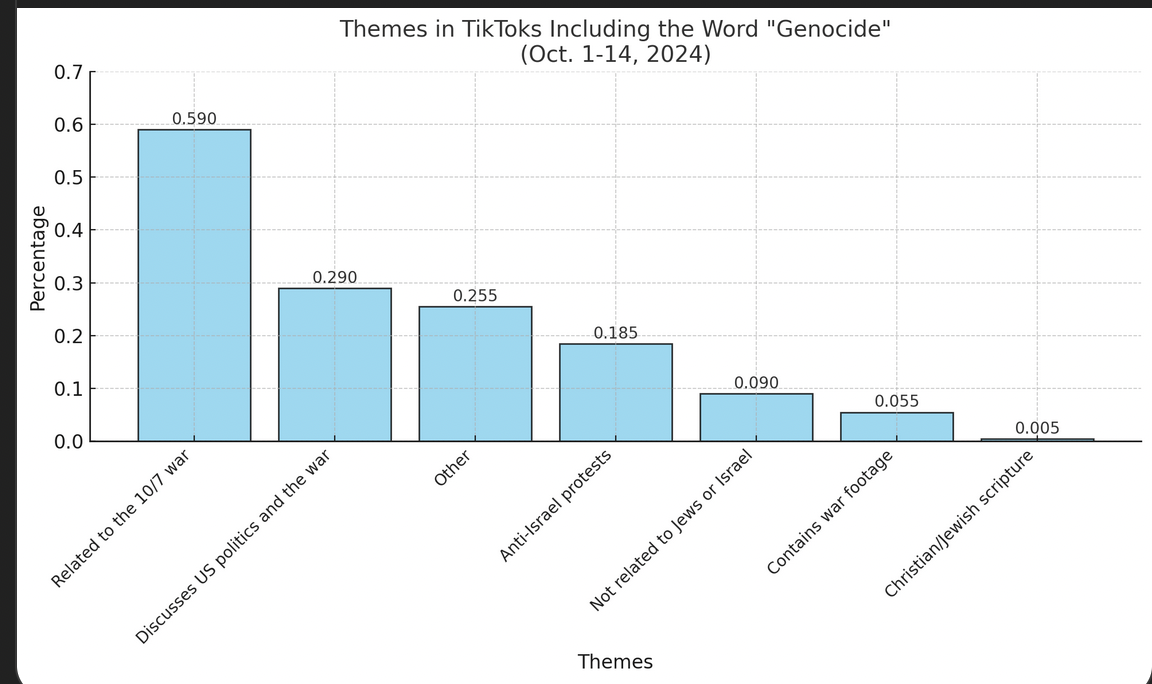
- Graph 7: Themes in TikToks Including "Genocide"
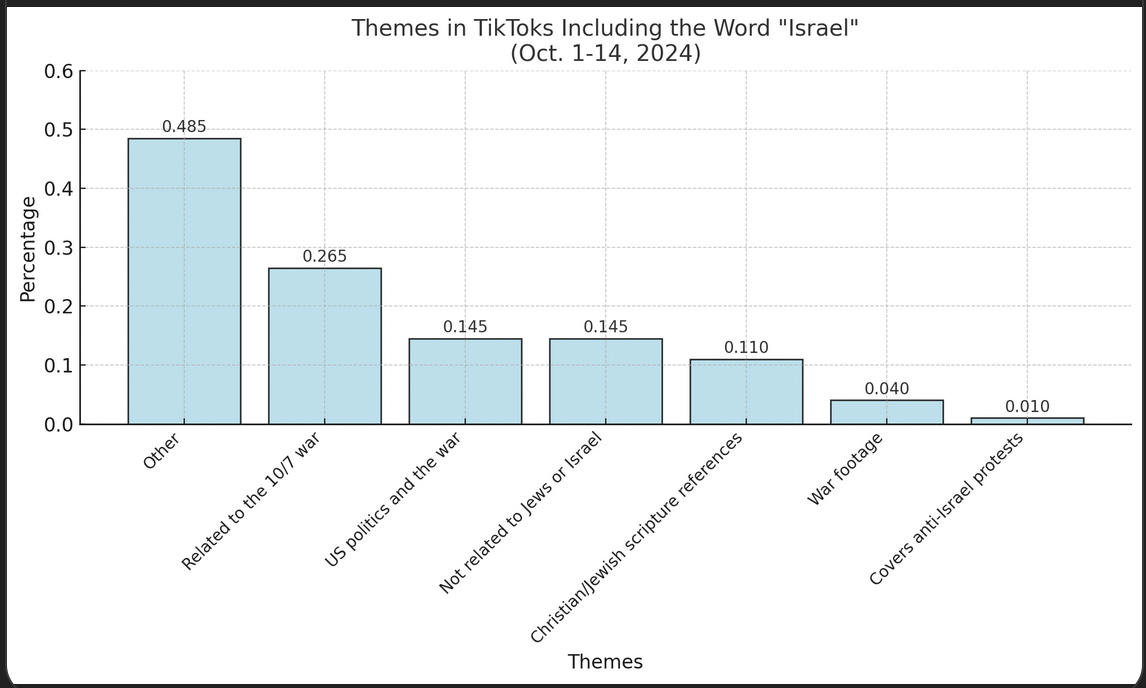
- Graph 8: Themes in TikToks Including "Israel"
Sentiments Toward Israel on TikTok
Sentiments on TikTok were polarized. In posts featuring “genocide,” a staggering 62.5% expressed negative views of Israel. No positive posts were found.
On a more hopeful note, posts with “Israel” painted a more balanced picture. 68.5% were neutral, 17.5% were positive, and only 14% were negative.
Graph 9 and Graph 10 show the sentiment breakdown:
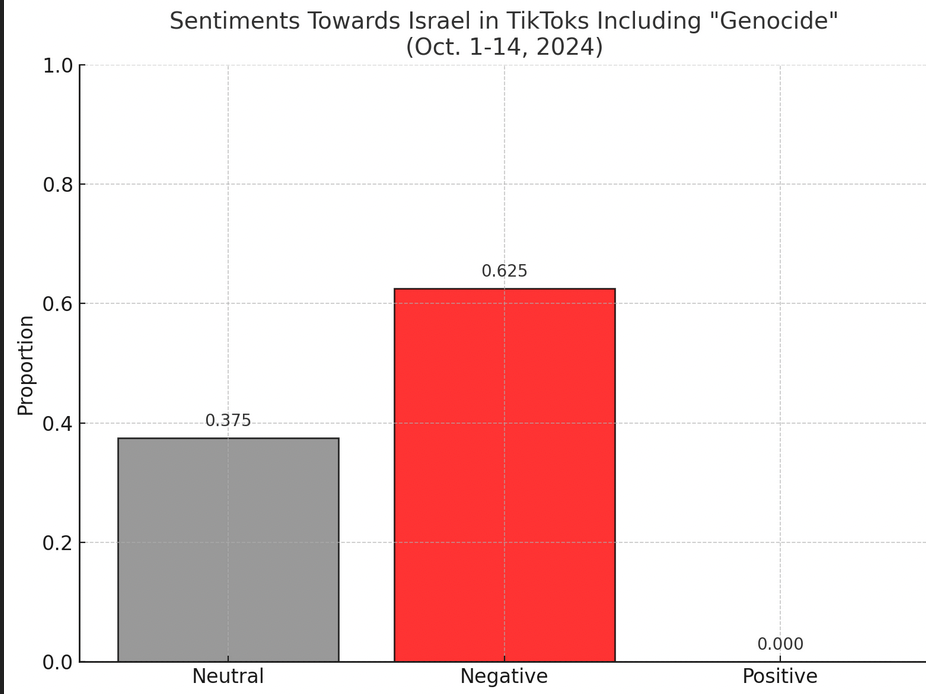
- Graph 9: Sentiments Toward Israel in TikToks Including "Genocide"
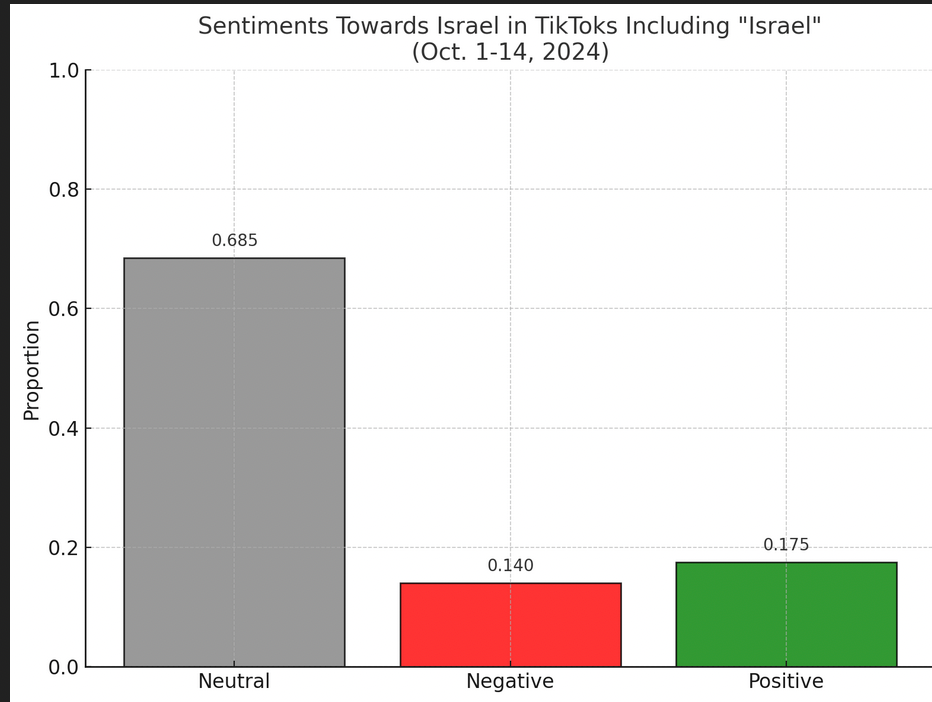
- Graph 10: Sentiments Toward Israel in TikToks Including "Israel"
Conclusion
This study reveals a troubling rise in antisemitism and hostility toward Israel on social media after October 7, 2023. On X, antisemitic content surged, while tweets calling it out dwindled over time. Accusations of genocide, war crimes, and apartheid dominated conversations, particularly in the immediate aftermath of the attack.
TikTok followed a similar trend, with posts about “genocide” overwhelmingly targeting Israel. However, posts containing “Israel” were more diverse and, in many cases, neutral.
What stands out is how quickly narratives shifted and how algorithms may amplify accusatory content. This poses serious challenges for fighting online antisemitism and misinformation.
Addressing these issues requires collaboration between researchers, policymakers, and platforms. We must create safer online spaces, challenge harmful rhetoric, and promote healthier, fact-based discussions on these critical issues.
Tim Orr is a scholar of Islam, Evangelical minister, conference speaker, and interfaith consultant with over 30 years of experience in cross-cultural ministry. He holds six degrees, including a master’s in Islamic studies from the Islamic College in London. Tim taught Religious Studies for 15 years at Indiana University Columbus and is now a Congregations and Polarization Project research associate at the Center for the Study of Religion and American Culture at Indiana University Indianapolis. He has spoken at universities, including Oxford University, Imperial College London, the University of Tehran, Islamic College London, and mosques throughout the U.K. His research focuses on American Evangelicalism, Islamic antisemitism, and Islamic feminism, and he has published widely, including articles in Islamic peer-reviewed journals and three books.
Sign up for Dr. Tim Orr's Blog
Dr. Tim Orr isn't just your average academic—he's a passionate advocate for interreligious dialogue, a seasoned academic, and an ordained Evangelical minister with a unique vision.
No spam. Unsubscribe anytime.
